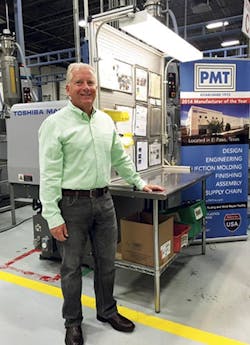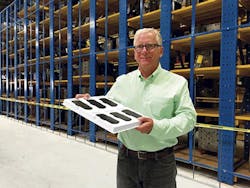Accomplishing the mission
As the second-generation CEO of Plastic Molding Technology (PMT), Charles A. Sholtis is leading the company into its 45th anniversary this year. Under his leadership, PMT was awarded the Manufacturing Leadership Council's 2014 Manufacturer of the Year award and he received the Society of Plastics Engineers' Business Management Award in 2015. Sholtis sees his stint in the U.S. Navy, the continuation of his dad's founding philosophies for PMT, and the company's focus on innovation, technology, U.S. manufacturing and its people as key factors in his and PMT's success.
Sholtis discussed his career with PMM correspondent Lisa Jo Lupo.
Just the facts
WHO IS HE: Charles A. Sholtis, CEO of Plastic Molding Technology Inc. (PMT)HEADQUARTERS: El Paso, TexasFOUNDED: 1973EMPLOYEES: 98 full-timeANNUAL REVENUE: $18 million in 2016FOCUS: Precision-engineered, injection molded components and highly technical, complex insert moldingFAMILY MATTERS: Wife Mary is training and development coordinator; daughter Jennifer Perez is marketing communications specialist
Why did you get into the plastics industry?Sholtis: My dad, Charles E. Sholtis, started PMT in Bridgeport, Conn., in 1973. I got my early start working on the floor alongside my dad as a summer job in high school. I originally wanted nothing to do with the business; my path in life was very clear to me — to get my commission in the United States Navy and get my business degree through Villanova University. So, I pursued that dream, serving in the U.S. Navy for one tour. It was a great experience, but then my life changed; my dad said, "Why don't you come back into the business?" and I'd gotten married and had my first child. So, I changed my career focus and outlook, though it was a tough decision for me.
As PMT VP of operations from 1995 to 1997, you formalized standard operating procedures. What changes did you make and why?Sholtis: The company was passing a milestone at that time, from an entrepreneurial business to a larger, more structured one. Coming out of the U.S. Navy, I had an appreciation for standard operating procedures aboard ships, so I began applying it to operating a factory, which is a very logical fit.I spearheaded a transition to ISO 9000, and plant floor optimization was next. By setting a PM [preventive maintenance] program for machinery and a new quality system, we started to improve uptime, so workflow and inspection criteria improved in the factory; and we adopted lean manufacturing. It was really a response to improving the operation's quality and productivity.
In 2001, PMT expanded with an operation in El Paso. Why?Sholtis: It was due to NAFTA. Many of our key customers in Connecticut began moving their assembly sites to Mexico, so they began asking PMT to set up a location in [the border] region to localize the supply chain. We evaluated several options, deciding on El Paso to set up a satellite facility due to Texas being a business-friendly state and its close proximity to Mexico. In 2004, the decision was made to relocate the entire operation to El Paso permanently. It was a gamble, but turned out to be the best strategic decision for the company.
Why is U.S. manufacturing important to PMT, the industry and the country?Sholtis: Since we changed presidencies, we've been hearing a lot about U.S. manufacturing. It's positioned at the top of American priorities and appears to be gaining some momentum. A closer look shows opportunities for reshoring, and the White House emphasis on U.S. manufacturing combined with rapid technology innovation has increased some of the optimism for growth in American-made products. We've also seen an uptick in customers and potential clients requesting information on the cost of reshoring. Being located on the border of Mexico, it's important to keep manufacturing here in the U.S., and I think we remain competitive in El Paso using American ingenuity and productivity while many of our competitors have moved to Mexico — and that's confirmed by feedback from our customers.
You recently invested in three Toyo all-electric injection molding machines. Why? How have they benefited PMT and your customers?Sholtis: Part of our strategy is technology. That started 15 years ago, but we really emphasized it in the last five years from an investment standpoint, which has been in the millions of dollars. It's helped us be more efficient with less downtime. Electric machines can be more efficient, they're sustainable in accordance with our manufacturing sustainability philosophy, and they can be more precise repeatability-wise. We've also standardized our plant floor with Toyo [and] Toshiba electrics that make up more than 50 percent of our machine base, due mainly to the quality, process control and the value that they're being made in Japan.We currently have 58 injection molding machines, the majority of which incorporate automation. We have one 500-ton Toyo, four 200-ton Toyos, one 200-ton Toshiba, one 110-ton Toshiba and two 400-ton FCS machines. In our toolroom we've invested in a CHMER EDM, nine Novatec dryers, nine Advantage thermolators, five HYRobotics pickers, four HY [HYRobotics] multi-axis robots and one Universal cobot.
What do you see as the role and importance of automation today — and into the future?Sholtis: At PMT, we see automation as integral to the molding process today. Not only does it reduce scrap labor costs and human errors, it can make our factory safer and much more efficient. The goal of automation is to optimize each process to make each product quickly and effectively, with less chance of operator fatigue and accidents and higher reliability of the process.
What do you see as the role and future of 3-D printing?Sholtis: We have the capability to do 3-D printing as a complement to the injection molding process for short runs and for fixtures and gauges. Our engineering team did a pilot study of 3-D printed mold inserts — we think it's valuable for the future of rapid prototyping, cutting down prototype tool costs and first shots. Our goal in the 3-D area is to be able to use printed mold cavities to improve cost, timing and quality of mold making. I think it's important from a technology standpoint as it evolves to make actual mold cavities. We don't have that capability yet, but we're exploring it.
You have been very active in the industry. Why is this important?Sholtis: I've been active in industry groups since the beginning of my career, because I believe in the importance of networking, benchmarking and continuously improving yourself and your business. My affiliations with different groups each provide me different opportunities for growth, learning and defining how I see the future of the industry and my company.
To what do you attribute PMT's and your success?Sholtis: I attribute PMT's success to the solid foundation on which the company was built, the ongoing commitment to grow and innovate without losing that foundational vision, and building a solid team committed to company success. Machinery and technology are very important, but if you don't have the people, the skilled workforce and the team to run it, you're not going to go very far.It's really very simple: Be true to yourself, your customers and your team, and I think good things will follow from that. The key also is perseverance to getting through adversity. I think I got that from my father as well as the Navy. You've got a mission, you've got to accomplish that mission, whether it's business, personal or otherwise.
What do you see as the greatest legacy of your father that you carry on?Sholtis: I think the greatest legacy is continuing the business in the USA, providing careers for a dedicated team. My dad cared about people; he had grit; he loved creating things and exploring new frontiers for manufacturing. He believed that giving back to the community was an important part of the business. We still apply those values and they have allowed me to succeed.
What would you like to be your legacy in the industry?Sholtis: I feel that business is a calling. My purpose enables me to grow the business in the community and give people a place to work. That's what I'd like to leave as a legacy: That PMT is a good company to work for, do business with and that I left it better than when I came in. I'd like my legacy to be one of embracing innovation and technology to make our company successful, along with the people that make that happen.



